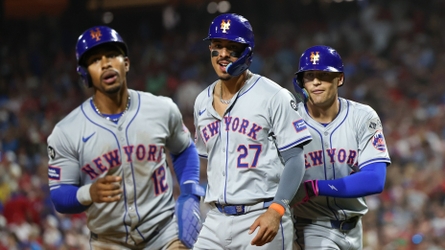The weekend began with the Mets coming off the “team of destiny” win in Toronto, which they followed up on Friday by bombing Aaron Nola, a nemesis of theirs over the years, and then taking an early 4-0 lead on Saturday.
Talk about riding a wave.
And yet barely more than 24 hours later the wave turned into a wipeout, in the form of two gut-wrenching losses, that again raises significant questions about whether these Mets can get to the finish line.
Welcome to pennant-race baseball, even if it’s for a wild-card berth. The highs are exhilarating, the lows are excruciating.
So now the question is: do the Mets, whose season has been defined by their ability to take a punch and come back fighting, have still another such response to the two losses in Philadelphia, including Sunday’s 2-1 walk-off loss in which Edwin Diaz served up the game-losing hit to JT Realmuto?
They come home to Citi Field for three games with the Washington Nationals and four with the Phillies before what could be a season-deciding series in Atlanta against the Braves, and suddenly the injury status of Francisco Lindor looms as perhaps their biggest issue.
Turns out his back has been bothering him for a couple of weeks, as he told reporters in Philly on Sunday, and the play Friday night where he stepped awkwardly on second base aggravated what he’d been feeling already.
That’s worrisome, obviously, especially since he tried to play Sunday and lasted only one inning.
Just as obviously, the Mets desperately need him to be the Lindor who was making a case to be the NL MVP, getting so many big hits in recent weeks.
Without him, the bats mostly went silent over the weekend. The Mets scored four early runs off a fill-in lefty, Koby Allard, on Saturday, but since then have scored only one run in their last 15 innings.
On Sunday they managed only one extra-base hit, Tyrone Taylor’s eighth-inning home run that provided a brief 1-0 lead, and six singles. Perhaps most alarmingly, Mark Vientos has suddenly gone stone cold, striking out in all four of his at-bats on Sunday as he is now 3-for-30 since hitting that walk-off home run against the Cincinnati Reds 10 days ago.
Lindor and Vientos have carried the load offensively for weeks now, and there is really no one else Mets fans can feel confident will step up in these final two weeks of the season.
Still, the resilience the Mets have demonstrated is reason alone to believe they’ll find ways to win games and at least take this race to the wire, especially because they continue to get strong starting pitching.
David Peterson was excellent on Sunday, bouncing back from the clunker in Toronto on Tuesday, his only poor start in the last two months. Peterson shut out the Phillies over the first seven innings, and was so dominant, giving up only two hits, and with a low pitch count that there should be no questioning Carlos Mendoza’s decision to have him pitch the eighth.
Even after allowing the Phillies to tie the game on back-to-back doubles, Peterson showed some toughness in getting Kyle Schwarber to ground out to second, with the infield in, keeping the go-ahead run at third base from scoring.
All in all, Peterson was brilliant, lowering his ERA to 2.85, and at this point, it’s pretty clear the Mets’ starters can match up with anybody these days.
But the bullpen, just when it seemed to be a little more trustworthy, let these last two games get away, and most concerning is that Diaz continues to have his ups and down, a problem that has hurt the Mets all season.
He had bounced back nicely from those two game-losing home runs in San Diego and Arizona a few weeks ago, pitching seven scoreless innings.
But he made crucial mistakes on Sunday that proved costly.
After allowing a one-out single to Nick Castellanos, he didn’t pay enough attention to him at first base, and though Castellanos is not fast, he easily stole second base to put the winning run in scoring position.
And then after getting ahead 0-2 on Realmuto, Diaz threw and up-and-away fastball that wasn’t nearly up-and-away enough, and the Phillies’ veteran catcher lined a single to the right-center gap as Castellanos scored without a play at the plate.
It was a mistake, especially because, as Keith Hernandez pointed out on the SNY telecast, Realmuto is a high-ball hitter with a swing to handle a pitch at the top of the strike zone.
I checked with an NL scout on that point and he confirmed what Hernandez said: “Realmuto can handle the ball upstairs with his short stroke and he’ll take it the other way in a situation like that. He was probably looking for a pitch in that area. If Diaz was going to go high, it needed to be in, not away.”
Actually, after two fastballs, Realmuto was set up for a slider away, but Diaz has shied away from his slider since giving up those two home runs a few weeks ago on that pitch. And he does need to attack with his fastball, but as always, he needs a balance to be at his best.
With all of that in mind, Diaz after the game told reporters the 0-2 pitch was “a really good pitch” and credited Realmuto for hitting it.
That makes his mistake even more troubling, indicating that Diaz wasn’t aware Realmuto likes the ball up.
As the scout said, “At worst that has to be a chase pitch in that situation. Way up.”
One other point: certainly there was a case to be made as well for intentionally walking Realmuto, even if the Phillies were likely to use lefty-hitting Brandon Marsh to hit for Weston Wilson.
But the bottom line is Diaz didn’t execute in a situation where he had the hammer at 0-2, and that has been a storyline in way too many tough losses for the Mets this season.
They’ve bounced back from many of them this season. Now they need to do it with the season very much on the line.
Read the full article here


























